De Nederlandse schrijver Arnon Grunberg werd geboren in Amsterdam op 22 februari 1971. Zie ook alle tags voor Arnon Grunberg op dit blog.
Uit: Huid en haar
‘Waar wacht je op?’ vraagt Lea.
Ze draagt een zwarte wollen jas met een bontkraag, tweedehands gekocht. Ze kan zich zulke jassen niet nieuw permitteren. Lea reist lichtbepakt. Een rugzak, meer heeft ze niet nodig voor vijf dagen. Met een föhn krijg je de meeste kreukels uit je kleren.
Op haar knie ligt een hand. Maar een hand op een knie is nog geen intimiteit.
‘Waarvan bent u precies een kenner?’ had een professor haar die avond tijdens een staande receptie gevraagd terwijl hij schijnbaar terloops haar bovenarm aanraakte. Ze had het onprettig gevonden. De vraag en de aanraking.
Een uur daarvoor had ze haar jurk in de badkamer opgehangen aan de rail waaraan ook het douchegordijn was bevestigd en hem met de föhn behandeld. De kreukels gingen er minder goed uit dan ze had gehoopt. Morgenochtend gaat ze naar huis, dan kan ze haar jurk laten stomen.
Kenner. Een belachelijk woord. Je kunt het eigenlijk alleen ontkennend gebruiken, als in: ‘Ik ben geen kenner van porseleinwerk.’ Ze is een kenner van Rudolf Höss, dat moest ze toegeven.
‘Höss,’ had ze geantwoord. Vervolgens had ze zich geëxcuseerd met de woorden: ‘Even kijken of hier nog meer mensen zijn die ik ken.’
In de verte, ingeklemd tussen een pilaar en een gesticule- rende man met een baard, had ze Roland Oberstein zien staan. Ze had de behoefte gevoeld om op hem af te stappen en zonder verdere plichtplegingen tegen hem te zeggen: ‘Red mij.’
Pathetisch natuurlijk. Maar is hoop op redding niet per definitie pathetisch? Hebben we leren leven zonder hoop? Als we al redding zoeken, mogen we dan alleen diep in onszelf graven?
Ze weigert dit te aanvaarden.
De professor was achter haar aangelopen. ‘Höss,’ had hij gezegd, ‘de commandant van Auschwitz. Boeiend. Had hij niet een verhouding met een gevangene in het kamp?”

Arnon Grunberg (Amsterdam, 22 februari 1971)
De Vlaamse dichter en schrijver Paul van Ostaijen werd geboren in Antwerpen op 22 februari 1896. Zie ook alle tags voor Paul van Ostaijen op dit blog.
Het dorp
Een vleermuis aan de nacht
hangt niet uw adem aan een vreemde adem
zo gij dit beseft het dorp
en de mensen nacht’lik huis aan huis
één licht – wellicht bij de pastoor –
en langs uw weg een late koe
In de wig van weg en stroom
is van de leegte zo het dorp
alsof ’t een boot was die maar voor korte tijd
op anker ligt
Om het staketsel kletst
het donkere water
gemeten
en vreemder dan een moorden zonder gil
Gij weet dat er geen gelaat is
waar gij binnen kunt
als in uw huis
En gij stoot overal der dingen oppervlak
een spiegel van uw eenzaamheid
een teller van uw korte reis
De vaas
Snijd van de struik de seringen
stel de bloemen in een aarden vaas
Zoals de aarden vaas draagt
glad juweel van geworden kennis
van zijn kleien oorsprong de herinnering
sluit gij met het laatste doen van uw handen uw verlangen
in de vereniging van de bloem met de aarden vaas
Spleen pour rire
Sophie-Fritz Stuckenberg zu eigen
Het meisje dat te Pampelune geboren tans te Honoloeloe woont
en in een rode lakkooi gevangen houdt
een kobaltblauwe papegaai
– zij schilderde hem met Ripolinkoeleuren
zoals gezeid de veren blauw
de snavel en de poten geel –
het meisje van Pampelune te Honoloeloe
dat om haar hoge hals heeft een krans van purperen anemonen
op haar opalen borst kleine barokkoralen
en om haar dijen niets
(Vogelveren dorsten haar dijen niet te dragen
zo zeer zijn dun haar dunne dijen)
dit pampeluner meisje dat te Honoloeloe woont
ken ik niet
Priez toujours pour le pauvre Gaspard
Il n’est pas encore mort ce soir.
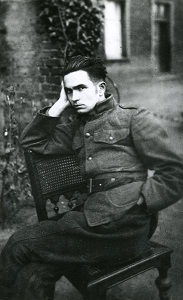
Paul van Ostaijen (22 februari 1896 – 18 maart 1928)
De Duitse dichter en schrijver Hugo Ball werd geboren op 22 februari 1886 in Pirmasens. Zie ook alle tags voor Hugo Ball op dit blog.
Legende
Vor einem hellen Marienbild
Spielte ein Bettler die Geige.
Die Vögel sangen im Herbstgefild,
Der Tag ging schon zur Neige.
Er spielte der Reben süße Last,
Die hingen ihm bis zur Stirne,
Er spielte den reifen Apfelast
Und der Berge schneeige Firne.
Er spielte der blauen Seen Licht,
Die leuchteten ihm aus den Augen.
Er sang zu der Geige und immer noch nicht
Wollte das Lied ihm taugen.
Da sang er den Mond und die Sterne dazu
Die konnte er alle verschenken
Und weinte des Waldes einsame Ruh,
Die tät seine Geige tränken.
Er spielte und sang und merkte kaum
Wie Maria sich leise bewegte
Und ihm beim Spiel ihrer Hände Schaum
Auf die wehenden Locken legte.
Er drehte beim Spiele sich hin und her,
Das tönende Holz unterm Kinne.
Er wollte, daß seine süße Mär
In alle vier Winde zerrinne.
Da stieg die Madonna vom Sockel herab
Und folgte ihm auf seine Wege.
Die gingen bergauf und gingen bergab
Durch Gestrüpp und Dornengehege.
Er spielte noch, als schon der Hahn gekräht
Und manche Saite zersprungen.
Auf Dreien spielt er die Trinität
Auf zweien die Engelszungen.
Zuletzt war es nur noch das heimliche Lied
Vom eingeborenen Sohne.
Maria deckte den Mantel auf ihn
Darin schläft er zum ewigen Lohne.
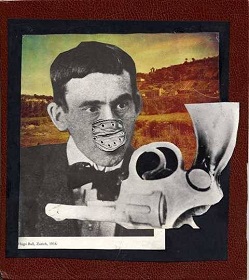
Hugo Ball (22 februari 1886 – 14 september 1927)
Collage door Erik Hurtado Saura
De Servische schrijver Danilo Kiš werd geboren op 22 febrari 1935 in Subotica. Zie ook alle tags voor Danilo Kiš op dit blog.
Uit: Hourglass (Vertaald door Ralph Manheim)
“The flickering shadows dissolve the outlines of things and break up the surfaces of the cube, the walls and ceiling move to and fro to the rhythm of the jagged flame, which by turns flares up and dies down as though about to go out. The yellow clay at the bottom of the cube rises like the floorboards of a sinking boat, then falls back into the darkness, as though flooded with muddy water. The whole room trembles, expands, contracts, moves a few centimeters to the right or left, up or down, all the while keeping its cubical shape. Horizontals and verticals intersect at several points, all in vague confusion, but governed by some higher law, maintaining an equilibrium that prevents the walls from collapsing and the ceiling from tilting or falling. This equilibrium is due no doubt to the regular movement of the crossbeams, for they, too, seem to glide from right to left, up and down, along with their shadows, without friction or effort, as lightly as over water. The waves of the night dash against the sides of the roomboat. Gusts of wind blow soft flakes and sharp icy crystals by turns against the windowpane. The square, embrasure-like window is stuffed with a disemboweled pillow; bits of cloth stick out and dangle like amorphous plants or creepers. It is hard to say whether they are trembling under the impact of the wind blowing through the cracks, or whether it is only their shadow that sways to the rhythm of the jagged flame.”
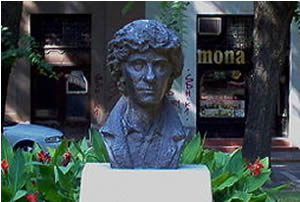
Danilo Kiš (22 februari 1935 – 15 oktober 1989)
Borstbeeld in Subotica
De Ierse schrijver Sean O’Faolain werd geboren op 22 februari 1900 in Cork. Zie ook alle tags voor Sean O’Faolain op dit blog.
Uit: An Irish Journey
“And yet it is a lovely, lovely place. Its slums, that have a hot verminous smell, indescribable and unique — walk down Millard Street of a hot summer day and you get the pure bouquet of it — come back to the memory before everything else with a geyser-gush of nostalgia. Cork’s poor are its kings. In these ambition has not sharpened the claw, and passion lives at blood-heat. The shawled women and girls (are they passing away into what they used to call, derisively, “hatty wans”?) are magnificent. Observe the coal-quay kids – often dressed in a costume, especially a Sunday costume, that I have seen nowhere else – purple stockings, fawny boots, halfway-up the calf, sometimes a bright velvet cap, golden tasselled, reflecting the half-barbaric love of colour that one used to see in the brilliance of the petticoats and shawls, and in the many half-inch-thick finger-rings and dangling earrings of the mothers roaring over the fish-crates. Note the men, in my youth, straightened by bouts in the North Cork Militia or the Munster Fusiliers, swaggering like sergeant-majors. In all of these there is the principle of life at its full.”
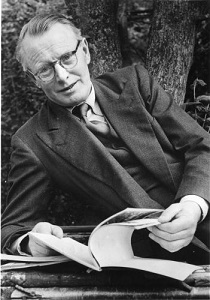
Sean O’Faolain (22 februari 1900 – 20 april 1991)
De Amerikaanse schrijfster Jane Bowles werd als Jane Auer geboren op 22 februari 1917 in New York. Zie ook alle tags voor Jane Bowles op dit blog.
Uit: Two Serious Ladies
“Where is your little house Miss Goering?” Arnold asked her, trying to introduce a more natural tone into the conversation. “It’s on an island,” said Miss Goering, “not far from the city by ferryboat. I remember having visited this island as a child and always having disliked it because one can smell the glue factories from the mainland even when walking through the woods or across the fields. One end of the island is very well populated, although you can only buy third-rate goods in any of the stores. Farther out the island is wilder and more old-fashioned; nevertheless there is a little train that meets the ferry frequently and carries you out to the other end. There you land in a little town that is quite lost and looks very tough, and you feel a bit frightened, I think, to find that the mainland opposite the point is as squalid as the island itself and offers you no protection at all. … ” Arnold shifted about uneasily in his chair. . . . “I am sure that the island has certain advantages too, which you know about, but perhaps you prefer to surprise with them rather than disappoint us.” “I know of none at the moment,” said Miss Goering. “Why, are you coming with us?” “I think that I would like to spend quite a bit of time with you out there; that is, if you will invite me.”
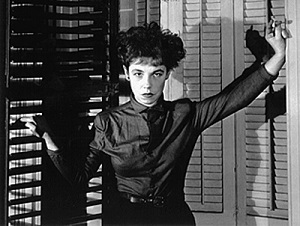
Jane Bowles (22 februari 1917 – 4 mei 1973)
De Afro-Amerikaanse dichter, schrijver en essayist Ishmael Scott Reed werd geboren op 22 februari 1938 in Chattanooga, Tennessee. Zie ook alle tags voor Ishmael Reed op dit blog.
Earthquake Blues
Well the cat started actin funny
and the dog howled all night long
I say the cat started actin very frightful
and the birds chirped all night long
The ground began to rumble
As the panic hit the town
Mr. Earthquake Mr. Earthquake
you don’t know good from bad
Mr. Earthquake Mr. Earthquake
you don’t know good from bad
You kill the little child in its nursey
You burn up the window’s pad
The buildings started swaying
like a drunk man walking hoome
The buildings started swaying
The people they were running
and the hurt folks began to moan
Mr. Earthquake Mr. Earthquake
you don’t know good from bad
Mr. Earthquake Mr. Earthquake
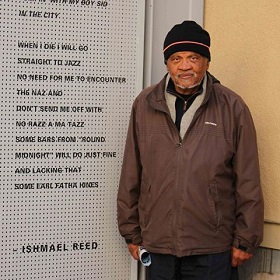
Ishmael Reed (Chattanooga, 22 februari 1938)
Bij de installatie van zijn gedicht “”When I Die I Will Go To Jazz”,
SFJAZZ Center, San Francisco
Zie voor nog meer schrijvers van de 22e februari ook mijn vorige blog van vandaag.
